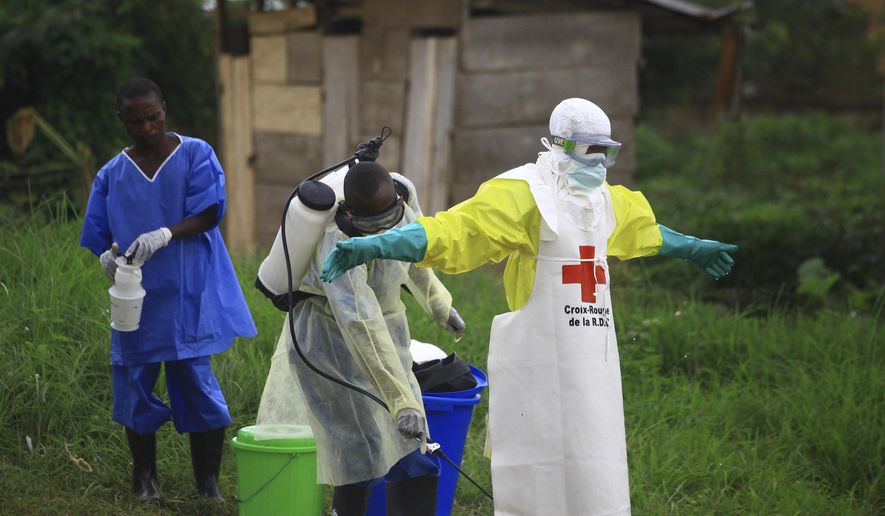The Ebola outbreak in Congo has infected nearly 330 people, making it the worst in the troubled nation’s history.
The tally exceeds that of Congo’s first epidemic, when Ebola was discovered in 1976. It’s the third worst in global history, though for now it trails far behind the outbreak that killed more than 11,000 in West Africa earlier this decade and the 400-plus cases in Uganda recorded nearly two decades ago.
The outbreak, which is unfolding in a North Kivu province riven by conflict, also passed a grim milestone over the weekend: The World Health Organization said the death toll now exceeds 200.
Despite setbacks and fears that the region’s instability will hurt containment efforts, Congolese officials vowed to fight “with passion and dedication” to protect their country and the rest of the globe.
“No other epidemic in the world has been as complex as the one we are currently experiencing,” Congolese Health Minister Oly Ilunga said in a video message posted Sunday. “Since their arrival in the region, the response teams have faced threats, physical assaults, repeated destruction of their equipment and kidnapping.”
Congo is used to dealing with Ebola. This is the 10th recorded outbreak and the second one this year.
Even so, responders say their worst fears are being realized as aid groups contend with attacks from armed rebel groups in the war-torn region and distrust in the community.
Beni, the town at the epicenter of the outbreak, sustained another violent attack over the weekend, officials reported, and nearby Uganda is bracing for the virus to cross its border.
WHO recently decided that the outbreak remains serious but does not constitute a global emergency. For one thing, it said, responders have more tools than ever to combat transmission.
More than 27,000 people have been given a trial vaccine developed by Merck. It’s not fully licensed but has been shown to be safe and effective in previous outbreaks. Earlier this month, WHO and local officials used the vaccination to protect front-line workers in five high-risk districts in neighboring Uganda, and 91 people appeared to recover after they were given one of four new therapies against Ebola in Congo.
Those advantages, however, have been contending with the region’s insecurity, meaning an outbreak that appeared manageable at the start is turning into a major logistical challenge for Congo.
The 329 cases reported in the current outbreak exceed the 318 measured in Yambuku in 1976, the year scientists first discovered Ebola — a serious, often-fatal disease that is transmitted to people from wild animals and spreads from human to human through the bodily fluids of people who exhibit symptoms.
It is also well beyond the 54 cases and 33 deaths reported from an outbreak this year in another part of Congo, according to a tracker maintained by the U.S. Centers for Disease Control and Prevention.
Yet it pales in comparison with the massive outbreak that struck Guinea, Liberia and Sierra Leone from 2014 to 2016, resulting in over 28,000 cases and more than 11,000 deaths.
Robert R. Redfield, director of the Centers for Disease Control and Prevention, recently suggested that it might be time to consider whether the outbreak can be fully stamped out, meaning the disease will may become endemic to the region.
The virus is already endemic in the animal population. Chances that it will become regularly found in the humans of a given area remain low because it is not transmitted readily and has proved too lethal in people for humans to be sustainable hosts, said Aditya Bhattacharji, health care director at Eurasia Group, a consultancy that studies risks abroad.
Amesh Adalja, a senior scholar at the Johns Hopkins University Center for Health Security, said the mere idea that officials are talking about Ebola becoming endemic “should be taken as a warning that, if the appropriate resources aren’t brought to bear on the outbreak, it could spiral out of control.”
“This is not a foregone conclusion and can be averted,” he said. “It is essential that barriers to implementing public health measures in populations that are displaced or unreachable because of security concerns be surmounted.”
• Tom Howell Jr. can be reached at thowell@washingtontimes.com.




Please read our comment policy before commenting.